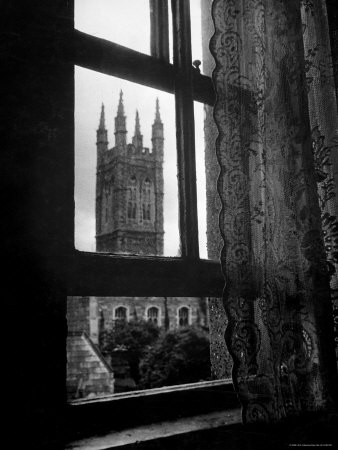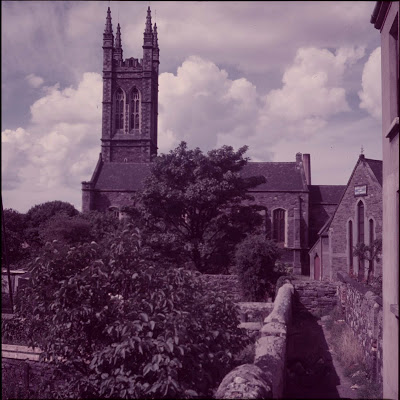“I thought that no man liveth and dieth to himself, so I put behind what I thought and what I did , the panorama of the world I lived in- the things that made me.” Sean O’Casey (1948)
Between 1939 and 1955 Sean O’Casey published six volumes of Autobiography. The first three in particular contain much about his life as a North Dock resident. Throughout this anniversary year, marking 50 years since his death , we intend to present short extracts from these works , concentrating on sections which are most relevant to the area . Over three days we are featuring sections on events during the Easter Rising 1916. O’Casey was a non combatant in the Rising , and his account is very much from a civilians perspective , and is a unique record of events locally , not recorded elsewhere. We move onto the events of Tuesday , the second day of the insurrection , as things become dangerous on Abercorn Road and St. Barnabas Church is commandeered by British Troops.
“Sean was behind his mother when she gawked out of the window in the back room, seeking to see something of what was happening.
-There’s some soldiers in th’ church tower, she said, the last word blending with a cracking roar, while the two of them staggered about the room, choked and blinded from a cloud of powered mortar thick as white thundercloud.
-I’m shot, Jack she whimpered; but feeling her all over, he found she wasn’t; and he hurried her into the other room where she lay down, panting, on the old horsehair sofa. He gave her a drink of water, then coaxed her down to a neighbour below who set about making a cup of tea for her. As he was going back to see what had happened, a number of soldiers, in charge of an officer and sergeant, came in and went upstairs with him, leaving two men to guard the outside door. The officer stood beside Sean, a revolver in his hand, while the sergeant searched the back room. After some time, the sergeant came out and whispered to the officer.
-Come downstairs with me, said the officer to Sean.
They placed him stiff against the wall of the house, outside, while the sergeant searched him, taking off his old boots to have a look inside, a soldier kneeling on one knee before him, butt of rifle to the knee, the bayonet but a foot away from Sean’s chest. They were searching for an automatic, they told him, and he wondered how one could fit into either of his boots. A violent explosion in the wasteland beyond the wall bordering the railway sent a storm of stones, tufts of grass, and bunches of poppies sky-high, showers of them falling around Sean and his searchers. Another, and then, a second later, a vicious ping on the wall beside him, sent Sean word that some sniper was having a shot at the soldiers around him. The officer slid down the street into a shop, and the soldiers, bending low, followed him, leaving Sean stretched out against the wall, alone, watched by neighbours who were peeping from their doorways in the houses lower down the street. He took his outstretched arms from the wall, turned in, and mounted the stairs to his home. While by the wall, he had felt that his end was near, and had had a stiff time trying to hold on to his pride and dignity. Now he was shaking, and tense with fright. Either the badly-aimed shells fired from the gunboat Helga or the sniper’s bullet may have saved his life. For a long time he had tried to keep out of danger, and as often had found himself in the thick of it. Three times, at work, he had had narrow escapes: once when a bucket had been whipped from a swinging hand by a train passing by at fifty miles an hour; once when a scaffold had collapsed, and he had come down with it, escaping with a bad shock and many sore bruises; and once on a high roof, cleaning glass, a fellow worker, in a hurry to show the foreman how alert he was, stepped on a plank, leading over the glass, before him; the plank had snapped, the glass had given way, and the poor devil had fallen forty or fifty feet, to be smashed to pieces on a concrete floor below. And today, he and his mother had had a stream of machine-gun bullets sweeping between their two heads, making a hash of the wall behind them. How often during the riots of drunken policemen had he escaped a batoning? More often than he wished to remember. He didn’t like this sort of thing at all. As he grew in grace and wisdom, he was growing less and less of a hero. Like the fine and upright Alderman Tom Kelly, he wanted to die in bed surrounded by medicine bottles.
Good God! Looka th’ mess the back room was in! The one old palliasse they had had been ripped open with a bayonet, and the dirty feathers had been scattered about. Their one mattress, too, had been torn the same way, and the straw, mixed with the feathers, littered the floor. And all this on top of his aching, trembling legs, and oozing neck. Had he been made of less sterner stuff, he’d have sat on the edge of the ruined bed to weep. But he must sway his thought away from an inclination to tears to hard resistance, and an icy acceptance of what was beyond his power to avoid.
He lighted some sticks, put some water into a small saucepan, and made himself a cup of tea. In the old dresser he found a small lump of loaf, and cut himself a slice; no more, for the neighbours might send back his mother any minute and she’s need her share. But he ate all the bread there. For he wanted all he could get to modify with new strength the energy lost through his oozing neck, his aching legs, and troubled mind. He was sipping the tea, when in came a sergeant and two Tommies, and his heart sank again.
-Ere, you, said the sergeant, motioning towards the Tommies, go with ‘em; the church; ‘urry! Why? Never mind the why. They ‘as their orders – that’s enough for you.
-Whose orders – the Lord Lieutant’s?
- Naw! Company officer’s. ‘Urry!
Sean sighed, and slipped a volume of Keats into a pocket, put on his cap, and went with them to the church. In the porch a young officer sat by a small table, a notebook before him, a pencil in hand. Name? Address? Age? Occupation? Sean saw the officer bend a searching look at him when he said, Unemployed. Another search. What’s this, eh? Oh, a book! Poetry – harmless enough. Why don’t you join the Army? No interest in armies – not even the Salvation Army. Civil answers, my man, will serve you better. Into the church with him.
Soldiers were asleep, asprawl, in the bapistry; others snored lying on the tiles of the chancel; and an armed sentry stood at the east end and west end of the church. Piles of haversacks, belts, boots, and rifles were heaped on, and around, the Communion Table. But two other prisoners were there, each widely separated from the other. It was strange to be this way in a church where he had so often sat as a worshipper, in which he found his first genuine, educated friend – the Rector. How angry he would be if he knew the soldiers were making themselves at home in the House of God! Do This in Remembrance of Me were words forming a semicircle above the Holy Table.
That whole evening, and throughout the night, he sat wearily on the hard bench, finding out that things even of beauty weren’t joys for ever.”
Extracts from “Drums under the windows” (1945)
All six volumes of Sean O’Casey Autobiographies, republished by Faber and Faber , are currently available in both print and kindle editions.
If you have a favourite Sean O’Casey extract please bring it to our attention .
Contact us at eastwallforall@gmail.com




